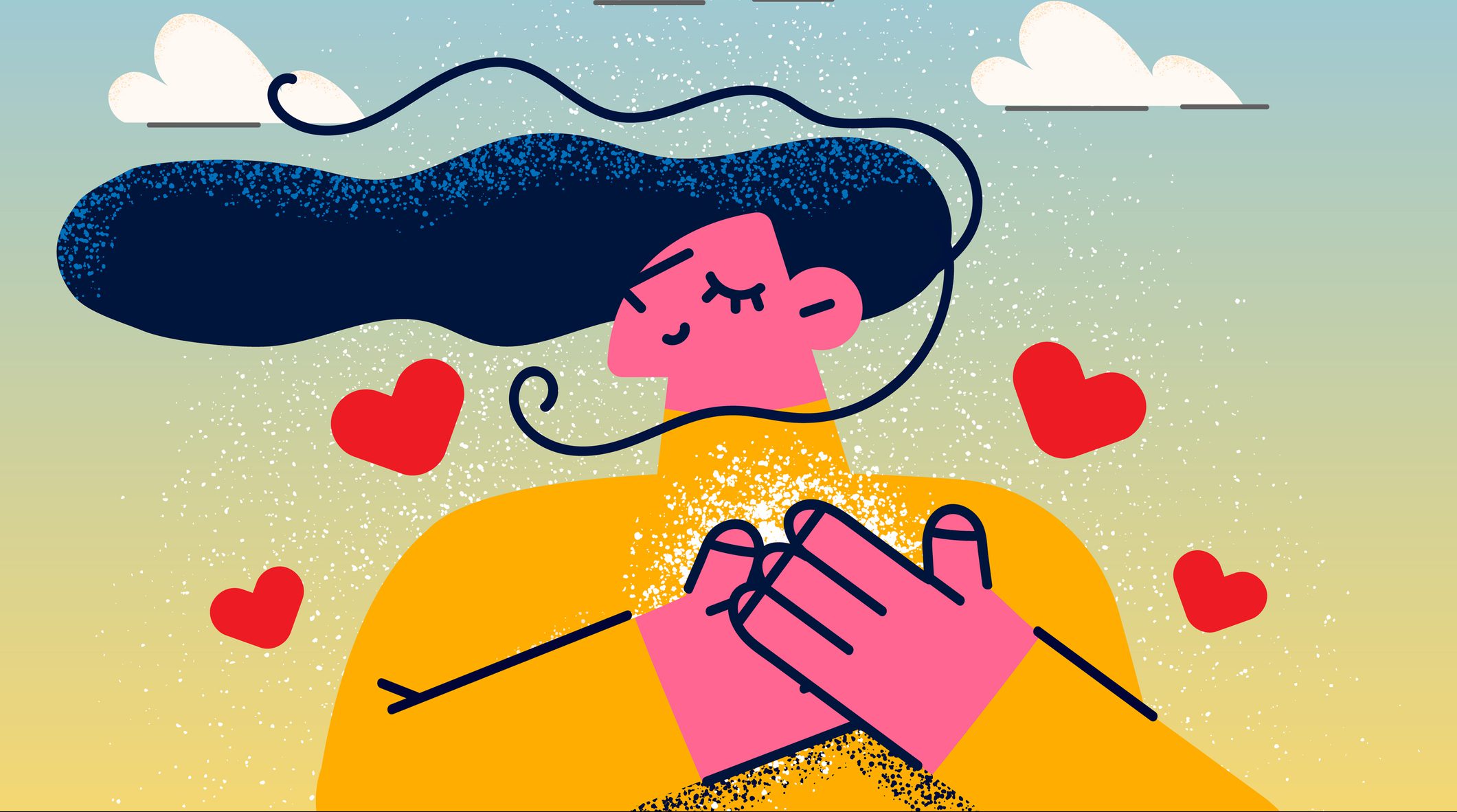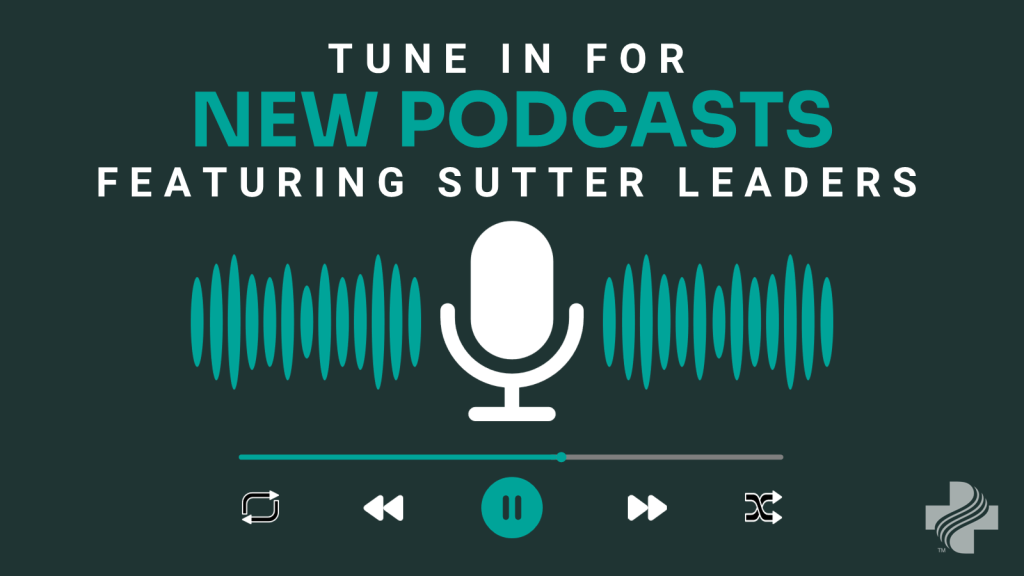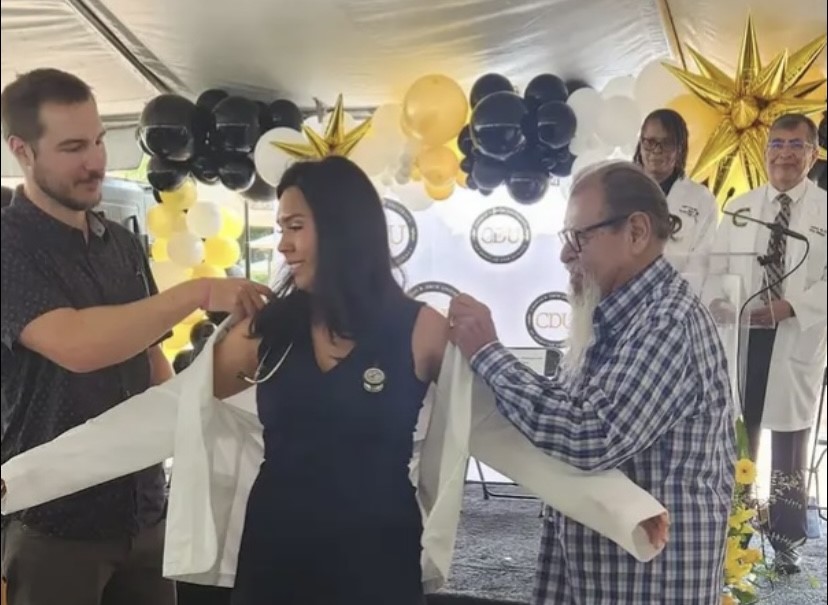After reading this article, you’ll to want to thank us. Why? Because showing gratitude has many benefits for your mental health.
As the nation kicks off May as Mental Health Awareness Month, Sutter Health in Northern California is focusing on how showing appreciation for your life, your family and friends, your home, your stuff, your job, your workmates and even your boss can all lead to a healthier, happier and more fulfilling life.
And, of course, it also does a world of good for the person you’re thanking.
Vitals asked a handful of experts to weigh in on why gratitude is important, especially in our world today. Here’s what they had to say:
VITALS: How can gratitude help with one’s overall mental health and emotional well-being?
Dr. Leif Hass, hospitalist at Sutter’s Alta Bates Summit Medical Center and an adviser for the Greater Good Science Center: Gratitude has been called the mother of all virtues for as long as we have had a written record. People who are dispositionally more grateful (those who perceive and appreciate the positives in life) report better relationships, higher life satisfaction and greater resilience. They are less materialistic, are less burned out, and are deemed to be more humble and wiser by their peers.
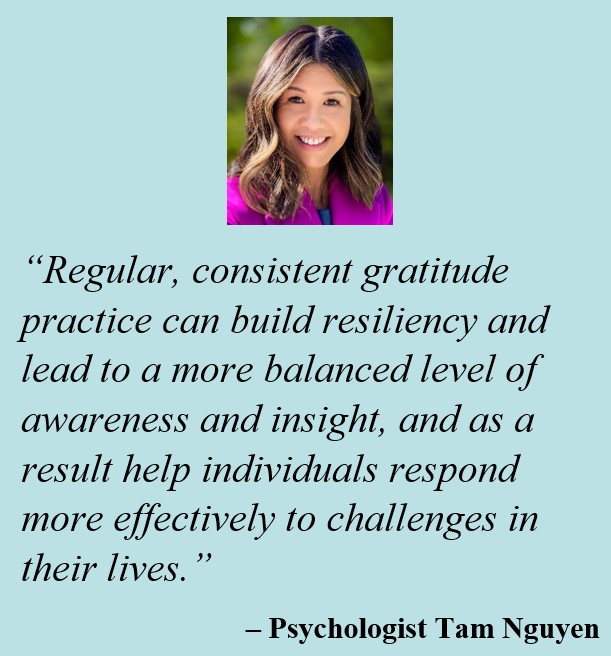 Psychologist Tam Nguyen, area director with Sutter’s Mental Health Services: The evidence-based treatment for depression and anxiety is cognitive behavioral therapy. To improve low mood, the treatment includes replacing unhelpful negative thoughts with alternative positive, accurate, helpful thoughts to reframe the situation, which is typically a challenging or stressful one. Engaging in gratitude practice can help provide a more balanced perspective of the situation in the context of their overall life and immediately improve mood. Regular, consistent gratitude practice can build resiliency and lead to a more balanced level of awareness and insight, and as a result help individuals respond more effectively to challenges in their lives.
Psychologist Tam Nguyen, area director with Sutter’s Mental Health Services: The evidence-based treatment for depression and anxiety is cognitive behavioral therapy. To improve low mood, the treatment includes replacing unhelpful negative thoughts with alternative positive, accurate, helpful thoughts to reframe the situation, which is typically a challenging or stressful one. Engaging in gratitude practice can help provide a more balanced perspective of the situation in the context of their overall life and immediately improve mood. Regular, consistent gratitude practice can build resiliency and lead to a more balanced level of awareness and insight, and as a result help individuals respond more effectively to challenges in their lives.
Chaplain Gerald Jones, director of Chaplain Services and Clinical Pastoral Education, Sutter Roseville Medical Center: I believe gratitude is a major key to mental health. I know when things get hectic and overwhelming, I can often forget to be grateful. I have learned to slow down and share my gratitude to others for their help, kindness or time that they have shared with me. When I do so, I feel more connected to that individual, which helps to build community. For example, my brother, who has a mental disability due to an anoxic brain injury at birth, currently lives in a long-term care facility. When I recently visited him, his nurse shared how much she really likes working with my brother. As I sat in his room and watched him interact with the care team, he constantly said “thank you” for any help they provided. It was evident that his gratitude for the team made their care of him easier and pleasurable.
Dr. Larry Marx, child psychiatrist and director of psychology at Sutter Mental Health Services: I think there’s an element of mindfulness with gratitude. It focuses you on the here and now. … If you’re having positive thoughts, it will help with your mood as well. So there are some positive mood changes when you’re focusing on what’s going well, either in your life or in the life of others.
VITALS: When it comes to gratitude, is it better to give than to receive?
Tam Nguyen: Like most things, it’s about maintaining a balance. It is beneficial to regularly practice giving and receiving gratitude. Giving and receiving gratitude is the practice of engaging in positive thoughts and behaviors, which lead to positive mood and mental health.
Gerald Jones: I believe both giving gratitude and receiving gratitude are equally important. I know that I always struggled to receive gratitude and would often brush off a “thank you” or a compliment with the response, “It really wasn’t that big of deal.” I recognize that doing so diminishes their gratitude. Now, I have learned how important it is to just say, “Thank you,” for the compliment or, “You are welcome,” for a thank you. When I do so, I notice that the other person also experiences those same good feelings.
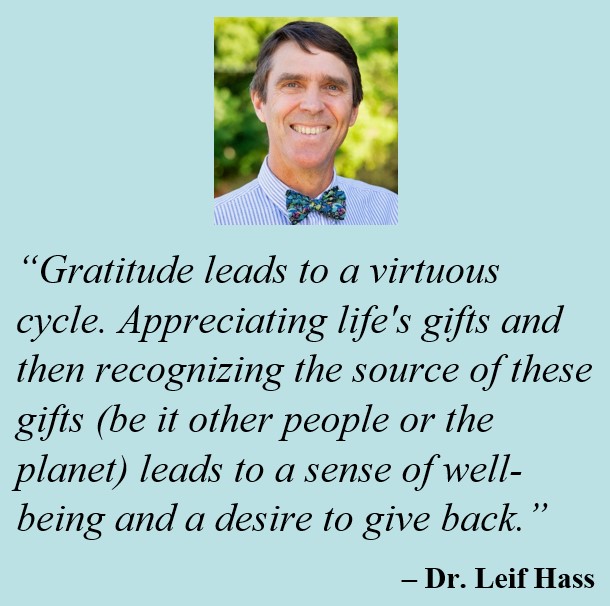 Dr. Hass: We all should be adept at both giving and receiving. Gratitude leads to a virtuous cycle. Appreciating life’s gifts and then recognizing the source of these gifts (be it other people or the planet) leads to a sense of well-being and a desire to give back. Once you start seeing life as a stream of life – food, drink, blue skies, electric lights, a safe and interesting workplace, people who care from you – then you are filled with a desire to pay forward.
Dr. Hass: We all should be adept at both giving and receiving. Gratitude leads to a virtuous cycle. Appreciating life’s gifts and then recognizing the source of these gifts (be it other people or the planet) leads to a sense of well-being and a desire to give back. Once you start seeing life as a stream of life – food, drink, blue skies, electric lights, a safe and interesting workplace, people who care from you – then you are filled with a desire to pay forward.
Dr. Laurie Gregg, Sutter OB/GYN and chief wellness officer for Sutter Independent Physicians: It’s important to give and receive gratitude, but there appears to be more benefit by giving and acknowledging it.
VITALS: Journaling has been seen as a way to express your gratitude. How does it help?
Dr. Gregg: As a wellness champion, I hand out gratitude journals to anyone I can. Gratitude has been proven to increase wellness, and I try to write down three good things that I’m grateful for every day in my gratitude journal: one that has to do with personal stuff, one that has to with work, and one that has to do with my friends.
Psychologist Nancy Maguire, clinical care director for Sutter Mental Health Services: Some of the largest studies on gratitude centered around journaling and the positive impact it can have. Before you go to sleep, if you journal and acknowledge what went well during the day and what things you have to look forward to the next day, that can create a sense of calmness and, in turn, can help with getting to sleep and having better sleep.
VITALS: How can gratitude help conquer FOMO (the “fear of missing out”), which is seeing others’ lives as being better and more successful than your own?
Dr. Hass: FOMO is real, and social media is at the root of it. The start of our current epidemic of mental illness in the younger members of our communities correlates precisely to when kids started getting smartphones in middle school. Practices that help us recognize all that is going right and all the small gifts life affords are fundamental to combat this. Gratitude letters and other interventions can help people who are struggling with depression and anxiety overcome their negative thought.
Tam Nguyen: The first step is having self-awareness that there is sensitivity or hyper-focus to noticing the negative aspects of their lives and to intentionally, look at the other side of the coin and consider the aspects of their lives that are going well and elevating those aspects equally to the challenges they are experiencing for a more balanced perspective.
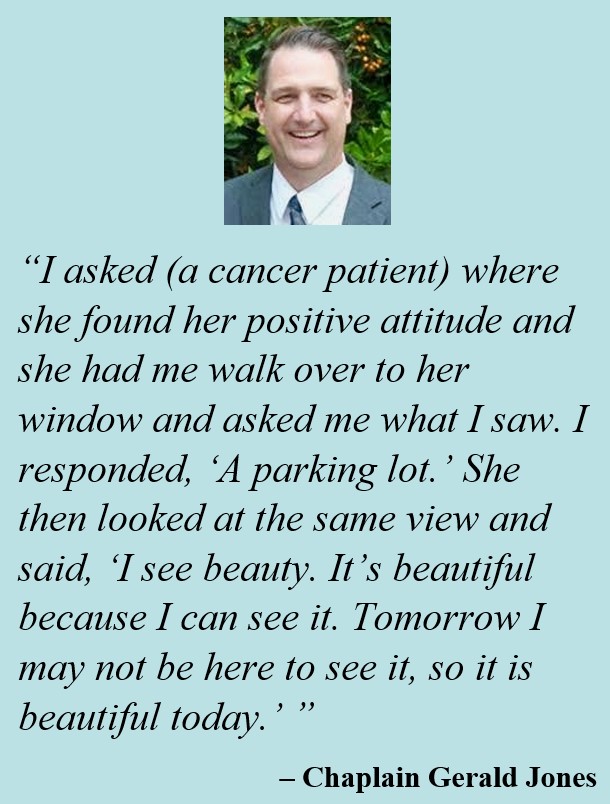 Nancy Maguire: Gratitude helps you focus on positive things as opposed to the negative, so it changes your perspective. It’s not about what’s missing in your life, but what you have in your life. It can be a pathway to having more empathy and more compassion. Because if you are grateful, then it allows you to understand people’s feelings more and be more compassionate to what they’re going through.
Nancy Maguire: Gratitude helps you focus on positive things as opposed to the negative, so it changes your perspective. It’s not about what’s missing in your life, but what you have in your life. It can be a pathway to having more empathy and more compassion. Because if you are grateful, then it allows you to understand people’s feelings more and be more compassionate to what they’re going through.
Gerald Jones: One thing that I have really come to appreciate about working directly with patients is that I get a chance to work with people who are grateful for the little things. I remember years ago I went to see a patient who was undergoing chemotherapy for ovarian cancer. When I met with her, she told me how happy she was that day. I asked her where she found her positive attitude, and she had me walk over to her window and asked me what I saw. I responded, “A parking lot.” She then looked at the same view and said, “I see beauty. It’s beautiful because I can see it. Tomorrow I may not be here to see it, so it is beautiful today.” This had such an impact on me that I took a picture from the window and have it hanging in my office. It is a daily reminder to have more gratitude for what I have.
VITALS: Many people of different faiths have a higher being, or God, to whom they may express their gratitude. How does expressing your gratitude in this way help with someone’s overall mental health?
Dr. Marx: Spirituality can play a part in gratitude, because it takes you out of yourself, and it helps you see the bigger whole.
Gerald Jones: For me, expressing gratitude outward reminds me that what I have is part of something bigger. Some people believe that life is part of a larger plan. Some see God as directing their lives while others see God as a co-journeyer who discovers our life with us. Regardless of the details, being able to offer gratitude outside of ourselves allows us to 1) acknowledge the value of the moment, 2) Imbed it more into our memories and 3) Look for additional areas of gratitude in our lives.
VITALS: If someone doesn’t have a belief in God or a higher being, how does one go about expressing that same type of gratitude?
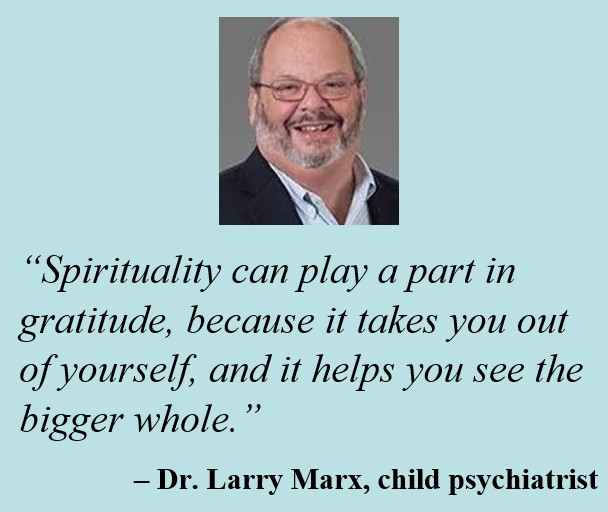 Tam Nguyen: In this scenario, one may acknowledge that our understanding and knowledge of the world around us is limited and appreciate what we do know, where we are at, and the possibility of future learnings.
Tam Nguyen: In this scenario, one may acknowledge that our understanding and knowledge of the world around us is limited and appreciate what we do know, where we are at, and the possibility of future learnings.
Gerald Jones: I remember years ago, when I was training to be a chaplain, one of my peers shared that he did not believe in “God” but did believe there was value in our connections as fellow human beings. When he gave thanks to the larger universe, he was thanking those connections between us all that helped him in his life. He was a very good chaplain and he was sincere in his gratitude for his connections with his fellow peers, his family, his community at large and his patients. Naming gratitude out loud, even if it is by yourself, helps imbed within us that something significant has occurred.
Dr. Hass: People who see more beauty in the natural world or in their fellow humans also are more grateful, so it is the practice of seeing beauty or connecting to a higher power that leads to gratitude.
VITALS: We’ve talked a lot about how gratitude can help with our emotional well-being. What are some of the other health benefits of gratitude?
Dr. Hass: The mother of all virtues does more than help the emotional wellbeing of the individual. Gratitude is associated with better health outcomes, such lower inflammatory markers, better control of chronic diseases, and assists in establishing healthy habits. Gratitude correlates with better romantic and platonic relationships and a broader network of social support. It evolved as social glue to hold human populations together. In the workplace, gratitude correlates with less burnout, better performance and a healthier work environment.
As a featured staff member of the Greater Good Science Center, Dr. Hass has contributed many stories on finding joy through work and outside activities. Here is one story on a “prescription” he wrote a patient that had nothing to do with medication, but helped the patient heal and feel more grateful for life.

